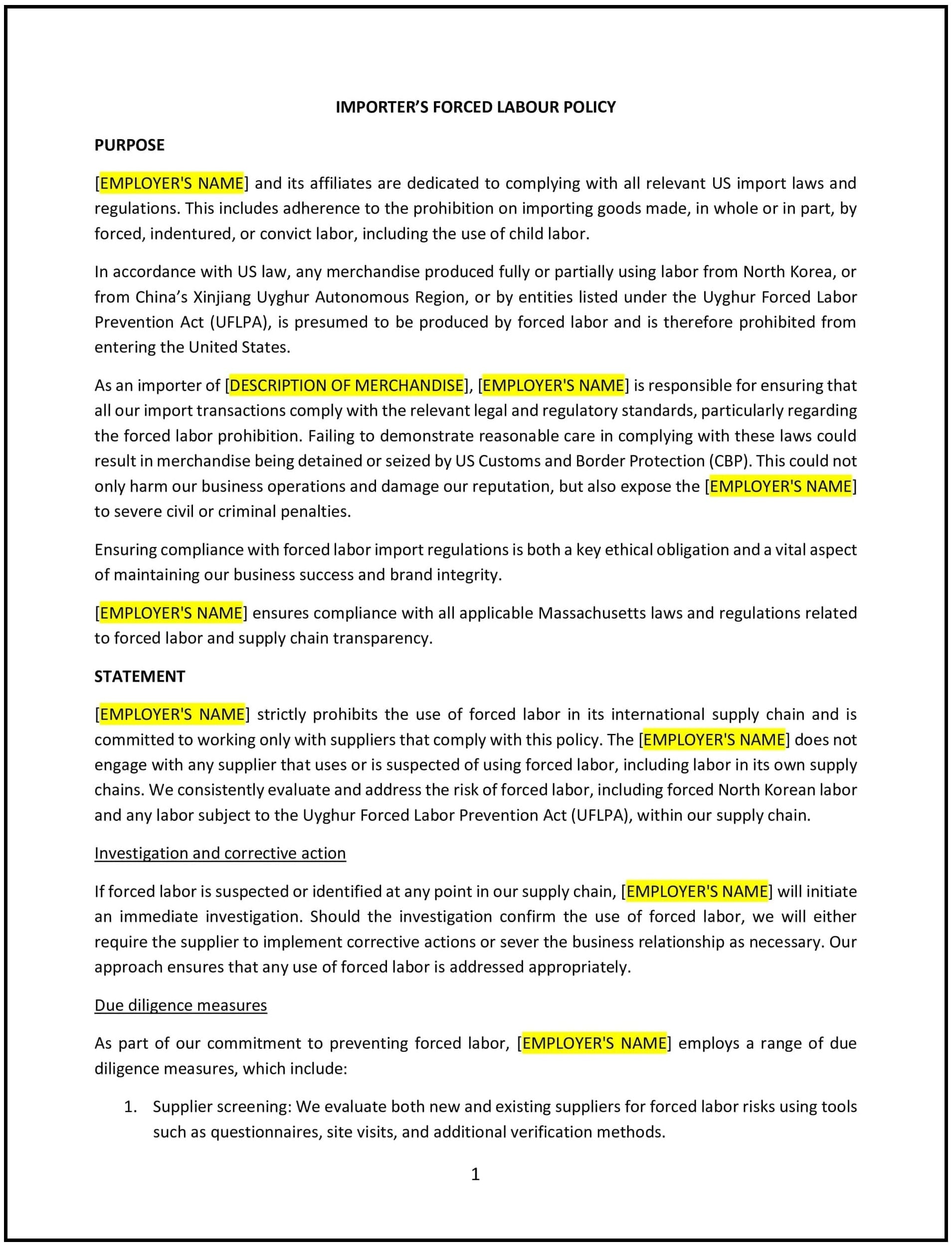Importer's forced labour policy (Massachusetts): Free template
Got contracts to review? While you're here for policies, let Cobrief make contract review effortless—start your free review now.

Customize this template for free
This importer’s forced labour policy is designed to help Massachusetts businesses ensure that they do not engage in, support, or benefit from forced labour in their supply chains. The policy outlines the company’s commitment to ensuring that all suppliers and partners comply with relevant laws and ethical standards that prohibit the use of forced, bonded, or child labour. It specifies the company’s procedures for conducting due diligence, monitoring suppliers, and addressing any instances of forced labour found in the supply chain.
By adopting this policy, businesses can demonstrate their commitment to ethical sourcing practices, reduce the risk of legal issues, and promote fair labour standards across their operations.
How to use this importer's forced labour policy (Massachusetts)
- Define forced labour: Clearly define forced labour and explain what constitutes illegal practices such as human trafficking, bonded labour, and child labour. The policy should explain the company’s zero-tolerance stance on forced labour and any related practices.
- Establish due diligence procedures: Outline the due diligence process the company will follow when sourcing goods, including conducting supplier audits, requiring suppliers to provide compliance statements, and verifying that their practices meet the company’s ethical standards.
- Set expectations for supplier compliance: Clearly state that suppliers and partners must comply with all applicable labour laws, including those prohibiting forced labour, under both Massachusetts state law and federal law. The policy should set expectations for suppliers to implement their own policies that prevent forced labour in their operations.
- Implement monitoring and reporting mechanisms: Specify the company’s approach to monitoring suppliers for forced labour risks, including site visits, third-party audits, or self-assessments. The policy should include steps for employees or other stakeholders to report suspected instances of forced labour or unethical practices.
- Outline corrective actions: Describe the actions the company will take if it discovers evidence of forced labour or unethical practices in its supply chain. This may include terminating supplier contracts, working with suppliers to implement corrective measures, or reporting violations to relevant authorities.
- Promote transparency and accountability: Encourage transparency within the supply chain by requiring suppliers to disclose their practices, certifications, and any audits that prove their compliance with labour laws. The policy should also specify that the company will take steps to ensure accountability within its own operations and supply chain.
- Ensure compliance with Massachusetts and federal laws: Ensure that the policy complies with Massachusetts state laws, such as the Massachusetts Human Trafficking Law, and federal regulations such as the Trafficking Victims Protection Act (TVPA) and the Tariff Act of 1930, which prohibits the importation of goods made with forced labour.
- Review and update regularly: Periodically review and update the policy to ensure it remains aligned with changing regulations, best practices, and the company’s evolving supply chain.
Benefits of using this importer's forced labour policy (Massachusetts)
This policy offers several benefits for Massachusetts businesses:
- Promotes ethical sourcing: The policy encourages businesses to source products from suppliers who uphold ethical labour standards, including eliminating forced labour, bonded labour, and child labour from their operations.
- Reduces legal and reputational risks: By ensuring compliance with labour laws and taking proactive steps to monitor supply chains, businesses can avoid legal penalties, fines, or reputational damage associated with forced labour.
- Enhances supplier accountability: The policy helps establish clear expectations for suppliers regarding labour standards and provides a framework for monitoring and enforcing compliance with those standards.
- Supports human rights: By eliminating forced labour from the supply chain, businesses contribute to the global effort to eradicate human trafficking and protect workers’ rights and dignity.
- Improves company reputation: Businesses that adopt a strong stance against forced labour are viewed positively by consumers, investors, and the public, which can enhance the company’s reputation as a socially responsible and ethical organization.
- Attracts ethical investors and customers: Ethical sourcing practices are increasingly important to customers and investors who prioritize social responsibility. The policy helps attract customers who value companies that align with their ethical and human rights values.
Tips for using this importer's forced labour policy (Massachusetts)
- Communicate the policy clearly: Ensure that all employees involved in sourcing or procurement are familiar with the policy and its requirements. This can be done through employee training, internal communications, or handbooks.
- Engage with suppliers: Work closely with suppliers to ensure they understand the company’s expectations and requirements regarding forced labour. Encourage suppliers to adopt their own policies and practices that align with the company’s standards.
- Conduct regular audits: Regularly audit suppliers to ensure compliance with the policy. Use third-party auditors or self-assessments to evaluate suppliers’ practices and identify any risks or violations.
- Maintain open channels for reporting: Create channels for employees, suppliers, and other stakeholders to report suspected incidents of forced labour. Ensure these reports are handled confidentially and promptly addressed.
- Implement corrective actions effectively: If forced labour or unethical practices are discovered, take immediate action to correct the situation. This may include providing training to suppliers, terminating contracts, or reporting violations to appropriate authorities.
- Review and update regularly: Review the policy annually to ensure it remains in line with changes in Massachusetts state laws, federal regulations, and industry best practices. Adjust the policy as needed to maintain effective enforcement and alignment with global ethical standards.